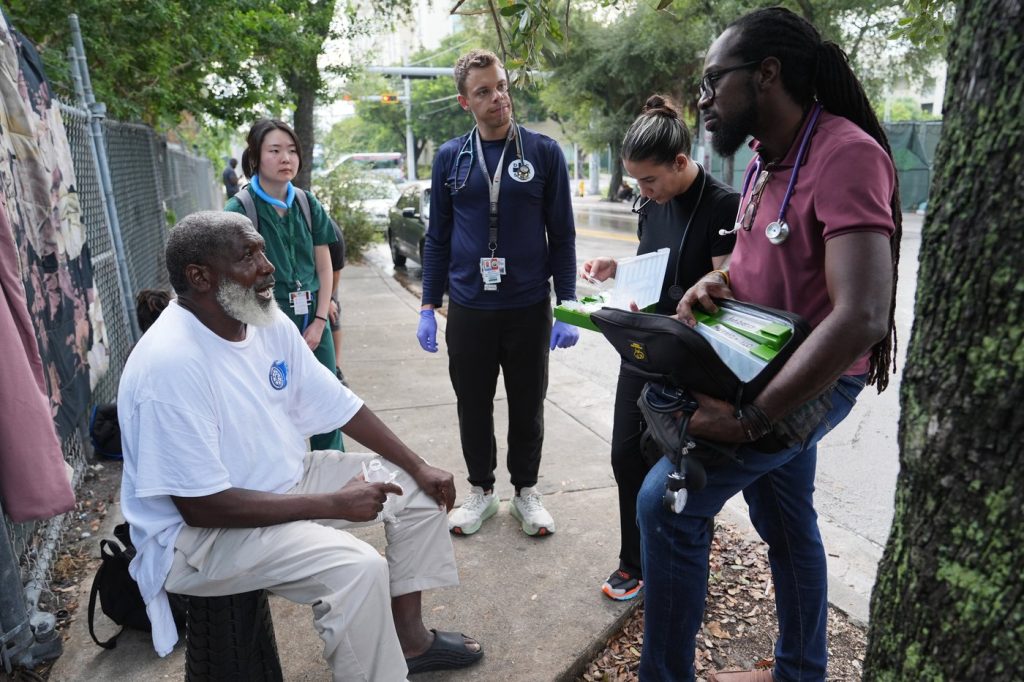MIAMI (AP) Jonas Richards, a former truck driver, faced homelessness several years ago after losing his job. Despite dealing with chronic health issues like high blood pressure and diabetes, seeking medical attention was not a priority for him while navigating life on the streets.
Richards shared, "When you're homeless, it's not easy. You find yourself hustling, trying to keep a little money in your pocket, trying to find something to eat." However, his situation improved when he had his first medical appointment with doctors from Miami Street Medicine, which was set up on a curb outside a homeless shelter.
Miami Street Medicine is a nonprofit organization that offers free mobile healthcare services to homeless individuals. It operates under the umbrella of Dade County Street Response, which also encompasses a free clinic named Doctors Within Borders, a disaster relief team, and a mental health crisis line.
The organization goes beyond providing basic first aid; teams of paid staff and medical student volunteers perform patient intakes using tablet computers and offer follow-up care for chronic conditions. They collaborate with specialists, including dermatologists, neurologists, and cardiologists, to address a diverse range of health issues.
According to Dr. Dan Bergholz, the founder of Miami Street Medicine, the objective of the initiative is to understand and meet the needs of their patients. "If that’s a cough drop, we’ve got you. But really the mission is so much greater," he stated, emphasizing the importance of building trust with patients. "So when that cough becomes pneumonia, they'll let us listen to their lungs and maybe trust us to take them to the hospital."
Dr. Bergholz initiated the groundwork for Miami Street Medicine about seven years ago after realizing that merely providing charity outreach was insufficient in making a real impact on the lives of homeless individuals. Following his acceptance to the University of Miami’s medical school, he and his fellow students began establishing the program and conducting what he described as a "needs assessment" by engaging directly with the homeless community.
The onset of the COVID-19 pandemic presented additional challenges, leading the team to adapt their approach. Dr. Bergholz connected with Dade County Street Response to broaden healthcare access to underserved areas, creating a more comprehensive safety net for those in need.
Despite offering vital services, the transient nature of the homeless population complicates the provision of persistent medical care. Dr. Armen Henderson, another founder of Dade County Street Response, noted that legal and societal barriers also hinder the ability of homeless individuals to access healthcare. "The criminalization of homelessness has significantly impacted our patients' ability to be in one place to get services," Henderson remarked.
Henderson emphasized that simply providing services actually does not incentivize greater homelessness: "The only thing that ends homelessness is easy access to housing. There’s nothing that encourages people to be unsheltered." He stressed that many individuals seek help to get off the streets and improve their situation.
Members of Miami Street Medicine have observed a rise in homelessness over the years, attributed to escalating housing prices and stagnant wages. Dr. Inaki Bent, who supervises street medicine teams, mentioned an increase in undocumented migrants on the streets, impacted by intensified immigration enforcement. "I see patients here who are no longer working because the fields and the construction sites have become targets," Bent explained.
Providing on-the-spot medical care not only benefits the patients but also aids in preventing manageable conditions from escalating into emergencies that could overburden the healthcare system. For instance, Bent described a patient who saved on emergency visits because Miami Street Medicine provided necessary medication that he could not afford otherwise. "We're hopeful this will prevent a couple more admissions," Bent concluded, highlighting the dual benefit of human service and systemic efficiency.
Through their efforts, Miami Street Medicine stands as a testament to the importance of accessible healthcare for the homeless, addressing immediate needs while also working to build long-term relationships and trust.










